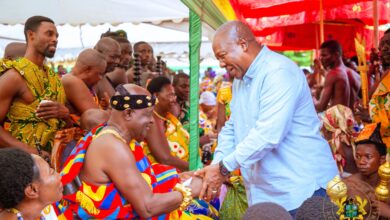
Leadership in both government and opposition plays a crucial role in shaping the trajectory of a country. It influences policies, guides societal progress, and carries a profound responsibility to serve the public, uphold democratic values, and foster an environment that promotes the well-being of citizens.
In this analysis, I will explore the multifaceted nature of leadership within government and opposition, examining the qualities and challenges that define effective leadership at the highest political levels.
The role of the Minority Leader of the New Patriotic Party (NPP) holds significant weight, especially as Afenyo-Markin leads the party through a period of political defeat under President Nana Addo’s leadership. There is an urgent need for the party and its leadership to refocus, re-energies, and re-organise at all levels to regain their footing.
Looking ahead, can the Minority Leader continue to carry this leadership style? Despite the National Democratic Congress (NDC) enjoying a sizable majority in Parliament, the NDC’s strategic approach to ministerial appointments and parliamentary vetting is carving a niche for its future success, potentially positioning John Dramani Mahama for another victory.
Qualities of Effective Leadership:
Visionary Thinking: Visionary leaders, whether in government or opposition, possess the ability to envision a better future for their nation and party. They articulate a compelling vision that resonates with the aspirations of the people, inspiring collective action toward shared goals. A clear vision offers a roadmap for development, fostering a sense of purpose and direction.
Integrity and Ethical Conduct: Integrity is the cornerstone of effective leadership. Leaders must demonstrate an unwavering commitment to ethical conduct, transparency, and accountability. Upholding the rule of law and ensuring ethical governance builds trust between the government and its citizens.
Strong Communication Skills: Effective communication is crucial for leaders to convey their vision, policies, and decisions to the public. Leaders who can articulate complex ideas in clear and accessible terms foster understanding and engagement. Transparent communication also promotes public trust and accountability.
Inclusive Decision-Making: In a democratic government and parliamentary democracy, inclusive decision-making is essential. Leaders must value diverse perspectives and engage in constructive dialogue with various stakeholders. Inclusivity ensures that policies reflect the needs and concerns of the entire population, fostering a more equitable society.
Resilience and Adaptability: Government leaders often face unforeseen challenges and crises. Resilience and adaptability are crucial qualities that enable leaders to navigate uncertainty, make informed decisions, and guide their nations through adversity.
President John Dramani Mahama has demonstrated a strong sense of judgment since taking office, effectively engaging the public with his policies and direction. This is reflected in a recent survey by Global InfoAnalytics, which indicates that Ghanaians believe the country is heading in the right direction.
On the other hand, the Minority Leader must be honest with his political conscience, acknowledging that the path ahead as the leader of the NPP, heading into the 2028 elections, is fraught with challenges. He must undertake self-reflection to address the critical tasks at hand.
NPP’s Decline and NDC’s Rise:
In the 2020 elections, NPP’s Nana Akufo-Addo secured a decisive victory with strong showings in urban and traditional stronghold regions. However, in 2024, under Mahamudu Bawumia’s leadership, the NPP saw a sharp decline, while the NDC, led by John Dramani Mahama, solidified its base and improved in key areas.
NPP’s Decline: The NPP experienced significant setbacks, particularly in regions that were once their strongholds. The most notable loss occurred in the Greater Accra Region, where NPP’s votes dropped by a staggering 46%. Nana Akufo-Addo’s 1,253,179 votes in 2020 fell sharply to 681,535 for Mahamudu Bawumia in 2024. Historically a swing region, Greater Accra now increasingly favors the NDC, a trend that strengthened in 2024.
NDC’s Gains: The NDC made impressive gains in key regions, with notable improvements in Bono (+16%), Western North (+3%), and Upper West (+2%). These gains reflect the NDC’s successful strategy of regaining support in critical swing regions.
NDC’s Setback in the Savannah Region: Despite overall gains, the NDC faced a setback in the Savannah Region, where Mahama’s vote share declined by 7%, from 144,244 in 2020 to 134,563 in 2024. This drop in Mahama’s home region could reflect dissatisfaction with local NDC performance or their campaign efforts.
National Overview: A Tale of Contrasting Fortunes
At the national level, the NPP saw a significant decline in voter support, with its total vote count dropping by 30.8% from 6,730,587 in 2020 to 4,657,304 in 2024. In contrast, the NDC saw a modest increase of 1.9%, rising from 6,213,182 votes in 2020 to 6,328,397 votes in 2024.
The overall trends indicate significant voter dissatisfaction with the NPP, especially in urban and swing regions. While the NDC made gains, these were modest and concentrated in specific regions, suggesting that both parties need to reassess their strategies ahead of future elections.
Key Takeaways:
NPP’s Losses: Greater Accra (-46%), Volta (-44%), and Central (-38%) Regions represent the party’s most severe setbacks.
NDC’s Gains: Strongest improvements were seen in Northern (+11%), Ahafo (+12%), and Bono (+16%) Regions.
Savannah Decline: Despite overall gains, the NDC suffered a 7% decline in the Savannah Region, which remains a significant challenge.
Leadership in government and opposition is a dynamic and demanding responsibility that requires a unique set of skills, qualities, and an unwavering commitment to public service. Effective leaders inspire confidence, promote inclusivity, and navigate complex challenges with resilience. In an era of global interdependence and rapid change, government leaders play a pivotal role in shaping the future of nations. Through visionary thinking, ethical conduct, and inclusive decision-making, they can contribute to building a just, prosperous, and sustainable society for generations to come.
Story by: Alexander Kukah




